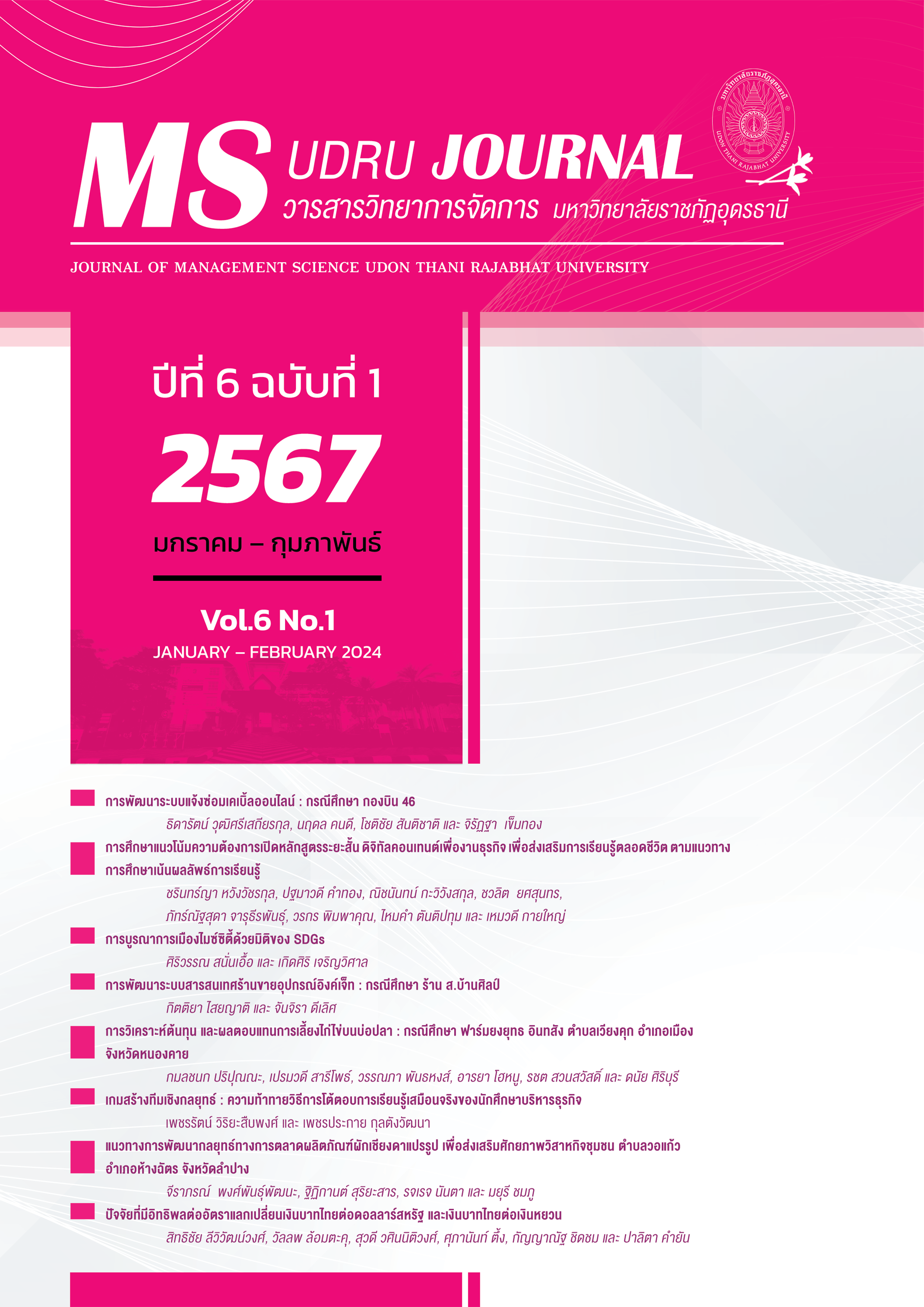เกมสร้างทีมเชิงกลยุทธ์: ความท้าทายวิธีการโต้ตอบการเรียนรู้เสมือนจริงของนักศึกษาบริหารธุรกิจ
Main Article Content
บทคัดย่อ
การวิจัยทางกลยุทธ์เป็นวิธีการที่เป็นระบบ เพื่อให้ได้กลยุทธ์หรือวิธีการใหม่ ความรู้ใหม่ ค้นพบกลยุทธ์การเรียนรู้แบบใหม่ เพื่อเตรียมพร้อมเสริมทักษะที่สำคัญสำหรับโลกอนาคต วัตถุประสงค์: สำรวจ ปัญหา อุปสรรค ของนิสิตบริหารธุรกิจต่อการเรียนเสมือนจริง และวิเคราะห์ สังเคราะห์ แนวทางการโต้ตอบจากการเรียนเสมือนจริงด้วยการจัดการเรียนรู้โดยใช้ทีมเป็นฐาน และการใช้เกมเป็นฐาน วิธีการ: คำถามการวิจัยที่ยังไม่ได้รับการศึกษาเชิงลึกมาก่อน ด้วยการสำรวจปัญหา อุปสรรค และการวิเคราะห์แนวทางการเรียนรู้ ลักษณะเชิงคุณภาพ ปลายเปิด ประชากรคือนักศึกษาบริหารธุรกิจ สังกัดมหาวิทยาลัยแห่งหนึ่งในประเทศไทยปีการศึกษา 2565 การศึกษาใช้ วิธีพรรณนาตามการวิเคราะห์เชิงคุณภาพ (Qualitative Research) และการวิเคราะห์เอกสาร (Documentary Research) ด้วยการวิเคราะห์เนื้อหา (Content Analysis) ผลลัพธ์: ผลการสำรวจ มีนักศึกษา (อายุระหว่าง 19-21 ปี) จำนวน 28 คนเข้าร่วมการให้สัมภาษณ์เชิงลึก เพศหญิงจำนวน 22 คน เพศชายจำนวน 6 คน คณะบริหารธุรกิจ มหาวิทยาลัยแห่งหนึ่ง ทุกคนเคยเรียนออนไลน์ ผลการวิเคราะห์ปัญหาการเรียนรู้เสมือนจริงเชิงคุณภาพ พบปัญหาการเรียนรู้ ได้แก่ สัญญาณอินเทอร์เน็ต สภาพแวดล้อม การเรียนรู้ สิ่งอำนวยความสะดวก สิ่งรบกวนขณะเรียนรู้ ขาดแรงจูงใจ เสียสมาธิ ปัญหาเกี่ยวกับสรีระ เช่น อาการปวดตา ปวดหัว ปวดหลัง ขาดปฏิสัมพันธ์กับเพื่อน ไม่มีสมาธิในการเรียน เกิดความขี้เกียจในการเรียน ส่วนอุปสรรคในการเรียนออนไลน์ ได้แก่ มีเสียงรบกวนขณะเรียนออนไลน์ และมีความเครียดในการเรียน ผลการวิเคราะห์เอกสาร สังเคราะห์ความท้าทายการเรียนรู้ เพื่อให้เกิดปฏิสัมพันธ์ การโต้ตอบจากการเรียนรู้เสมือนจริง คือ เกมสร้างทีมเชิงกลยุทธ์ เป็นกลยุทธ์การเรียนรู้ที่พัฒนาจากการผนวก การเรียนรู้โดยใช้ทีมเป็นฐาน และการเรียนรู้โดยใช้เกมเป็นฐานสำหรับการเรียนรู้เสมือนจริงของนักศึกษาบริหารธุรกิจ
Article Details

อนุญาตภายใต้เงื่อนไข Creative Commons Attribution-NonCommercial-NoDerivatives 4.0 International License.
บทความที่ได้รับการตีพิมพ์เป็นลิขสิทธิ์ของคณะวิทยาการจัดการ มหาวิทยาลัยราชภัฏอุดรธานี
ข้อความที่ปรากฏในบทความแต่ละเรื่องในวารสารวิชาการเล่มนี้
ไม่ใช่ความคิดเห็นและความรับผิดชอบของผู้จัดทำ บรรณาธิการ กองบรรณาธิการ และคณะวิทยาการจัดการ มหาวิทยาลัยราชภัฏอุดรธานี ความรับผิดชอบด้านเนื้อหาและการตรวจร่างบทความแต่ละเรื่องเป็นความคิดเห็นของผู้เขียนบทความแต่ละท่าน
เอกสารอ้างอิง
วิจารณ์ พานิช. (2556). ครูเพื่อศิษย์ สร้างห้องเรียนกลับทาง. มูลนิธิสยามกัมมาจล. บริษัท เอส.อาร์.พริ้นติ้ง แมสโปรดักส์ จำกัด.
สาวิณีย์ พลเยี่ยม และ พิมพ์สิริ ชูศรีโฉม. (2565). องค์ประกอบของคุณลักษณะที่พึงประสงค์ของนักศึกษาสาขาวิชาการจัดการการท่องเที่ยวและ การบริการ มหาวิทยาลัยราชภัฏอุดรธานี. วารสารวิทยาการจัดการ มหาวิทยาลัยราชภัฏอุดรธานี. 4(6) 109-120.
Andrienko, T., Genin, V., & Kozubska, I. (2021). Developing Intercultural Business Competence via Team Learning in Post-Pandemic Era. Advanced Education, 8(18), 53–69.
Kennelly, A. & Fantino, F. (2007). The Sharing Game: Fairness in resource allocation as a function of incentive, gender, and recipient types. Judgment and Decision Making, 2(3), 204–216.
Barbara, A. (2007). Time to Learn? E-learners’ Experiences of Time in Virtual Learning Communities. Management Learning. Copyright © 2007 Sage Publications Los Angeles, London, New Delhi and Singapore. 38(5), 557–572., 1350–5076.
Bailey, J. et al. (2021). Interdisciplinary Team-Based Learning: An Integrated Opportunity Recognition and Evaluation Model for Teaching Business, Engineering and Design Students. Entrepreneurship Education and Pedagogy, 4(2), 143–168.
Cisek, G. (2021). Paradise Times or the End of the World?: The Future with AI. In: The Triumph of Artificial Intelligence. Springer, Wiesbaden. Retrieved February 25, 2023, from https://doi.org/10.1007/978-3-658-34896-0_8
Gates, B. (2023). The Age of AI has begun. Artificial intelligence is as revolutionary as mobile phones and the Internet. March 21, 2023. GateNotes The Blog of Bill Gates. Retrieved February 4, 2023, from https://www.gatesnotes.com/The-Age-of-AI-Has-Begun
Muraina, I., Aiyegbusi, A. & Lesi. B. (2022). Ensuring Team Building Learning with the Use of Relevant Collaborative Tools. 03 February. Middle east international conference on contemporary scientific studies-VI.
Lüftenegger, E., Comuzzi, M., & Grefen, P. (2013). The Service-Dominant Ecosystem: Mapping a Service Dominant Strategy to a Product-Service Ecosystem. In: Camarinha-Matos, L.M., Scherer, R.J. (eds) Collaborative Systems for Reindustrialization. PRO-VE 2013. IFIP Advances in Information and Communication Technology, 408 (Springer, Berlin, Heidelberg). Retrieved May 20, 2023, from https://doi.org/10.1007/978-3-642-40543-3_3
Kuznetsova,M., Gura, D., & Slivinskaya, L. (2023). Virtual Team Building in an Intelligent Collaborative Learning Environment. Journal of Information Technology Education: Research. 22, 157-175.
Spitzer et al. (2021). Curiosity as a Function of Confidence and Importance in Knowing Information. Retrieved April 22, 2023, from https://www.researchgate.net/publication/355945141_Curiosity_as_a_Function_of_Confidence_and_Importance_in_Knowing_Information
O'Hanlon, D. et al. (2019). Team Based Learning for enhanced engagement in larger class settings: Experiences of business school staff and students. Pedagogy for Higher Education Large Classes (PHECL19), co-located with the 5th International Conference on Higher Education Advances (HEAd'19) (PHELC), Universitat Politècnica de València, Valencia, Spain. Retrieved April 20, 2023, from https://doi.org/10.5281/zenodo.3251703.
Porter, E. M. (1996). What is Strategy?. Harvard Business Review. 74(6). 61-78.
Porter, M. E. (1985). The Competitive Advantage: Creating and Sustaining Superior Performance. New York: Free Press.
Trotta, A., Ziosi, M. & Lomonaco, V. (2023). The future of ethics in AI: challenges and opportunities. AI & Soc. Retrieved April 25, 2023, from https://doi.org/10.1007/s00146-023-01644-x.
Hanghøj, T, Hajslund, S., & Ejsing-D. S. (2022). The challenges of designing learning games: Interviewing professional learning game designers. 16(1). Proceedings of the 16th European Conference on Games Based Learning.
Miaohui, W. et al. (2022). An empirical study of the relationship among communication, trust and performance of undergraduate course learning team: Based on structural equation model. Cogent Education. 9(1).
Ward, A. (2017). The sign of a good strategy is that it makes some customers unhappy. Retrieved April 20=3, 2023, from https://www.linkedin.com/pulse/sign-good-strategy-makes-some-customers-unhappy-andrew-ward.


